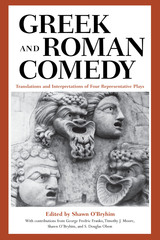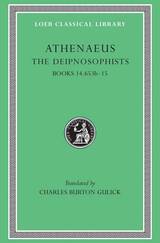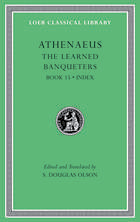
This is the first substantial commentary on Clouds since Dover’s 1968 edition. Intended for intermediate Greek students at undergraduate and graduate levels, the commentary pays careful attention to the basic characteristics of ancient Greek syntax, as well as to how Greek words are formed and can be analyzed. It offers robust staging notes, information about daily life in late 5th-century Athens, and constant reference to the rhetorical and dramatic strategies of the text. Full support is offered for those interested in the metrical structure of the songs, but in a way that allows instructors to leave such issues aside, should they choose to do so. The first and second appendices offer a basic means of entry into the rich but complex world of the comic fragments. An English-language bibliography is provided. The edition will interest professional classicists of all sorts seeking an accessible introduction to one of Aristophanes’ greatest plays, to philosophers concerned with Socrates and the sophistic movement, and to theater professionals who wish to stage the play.

Much of what we know of Greco-Roman comedy comes from the surviving works of just four playwrights—the Greeks Aristophanes and Menander and the Romans Plautus and Terence. To introduce these authors and their work to students and general readers, this book offers a new, accessible translation of a representative play by each playwright, accompanied by a general introduction to the author's life and times, a scholarly article on a prominent theme in the play, and a bibliography of selected readings about the play and playwright.
This range of material, rare in a single volume, provides several reading and teaching options, from the study of a single author to an overview of the entire Classical comedic tradition. The plays have been translated for readability and fidelity to the original text by established Classics scholars. Douglas Olson provides the translation and commentary for Aristophanes' Acharnians, Shawn O'Bryhim for Menander's Dyskolos, George Fredric Franco for Plautus' Casina, and Timothy J. Moore for Terence's Phormio.

Hellenistic history.
The historian Polybius (ca. 200–118 BC) was born into a leading family of Megalopolis in the Peloponnese (Morea) and served the Achaean League in arms and diplomacy for many years, favoring alliance with Rome. From 168 to 151 he was held hostage in Rome, where he became a friend of Lucius Aemilius Paulus and his two sons, especially Scipio Aemilianus, whose campaigns, including the destruction of Carthage, he later attended. Late in his life he became a trusted mediator between Greece and the Romans; helped in the discussions that preceded the final war with Carthage; and after 146 was entrusted by the Romans with the details of administration in Greece.
Polybius’ overall theme is how and why the Romans spread their power as they did. The main part of his history covers the years 264–146 BC, describing the rise of Rome, her destruction of Carthage, and her eventual domination of the Greek world. It is a great work: accurate, thoughtful, largely impartial, based on research, and full of insight into customs, institutions, geography, the causes of events, and the character of peoples. It is a vital achievement of the first importance despite the incomplete state in which all but the first five of its original forty books have reached us.
For this edition, W. R. Paton’s excellent translation, first published in 1922, has been thoroughly revised, the Büttner-Wobst Greek text corrected, and explanatory notes and a new introduction added, all reflecting the latest scholarship.
The Loeb Classical Library edition of Polybius is in six volumes.

Scholars at dinner.
In The Learned Banqueters, Athenaeus describes a series of dinner parties at which the guests quote extensively from Greek literature. The work (which dates to the very end of the second century AD) is amusing reading and of extraordinary value as a treasury of quotations from works now lost. Athenaeus also preserves a wide range of information about different cuisines and foodstuffs; the music and entertainments that ornamented banquets; and the intellectual talk that was the heart of Greek conviviality. S. Douglas Olson has undertaken to produce a complete new edition of the work, replacing the previous seven-volume Loeb Athenaeus (published under the title Deipnosophists).

Scholars at dinner.
In The Learned Banqueters, Athenaeus describes a series of dinner parties at which the guests quote extensively from Greek literature. The work (which dates to the very end of the second century AD) is amusing reading and of extraordinary value as a treasury of quotations from works now lost. Athenaeus also preserves a wide range of information about different cuisines and foodstuffs; the music and entertainments that ornamented banquets; and the intellectual talk that was the heart of Greek conviviality. S. Douglas Olson has undertaken to produce a complete new edition of the work, replacing the previous seven-volume Loeb Athenaeus (published under the title Deipnosophists).

Scholars at dinner.
In The Learned Banqueters, Athenaeus describes a series of dinner parties at which the guests quote extensively from Greek literature. The work (which dates to the very end of the second century AD) is amusing reading and of extraordinary value as a treasury of quotations from works now lost. Athenaeus also preserves a wide range of information about different cuisines and foodstuffs; the music and entertainments that ornamented banquets; and the intellectual talk that was the heart of Greek conviviality. S. Douglas Olson has undertaken to produce a complete new edition of the work, replacing the previous seven-volume Loeb Athenaeus (published under the title Deipnosophists).

Scholars at dinner.
In The Learned Banqueters, Athenaeus describes a series of dinner parties at which the guests quote extensively from Greek literature. The work (which dates to the very end of the second century AD) is amusing reading and of extraordinary value as a treasury of quotations from works now lost. Athenaeus also preserves a wide range of information about different cuisines and foodstuffs; the music and entertainments that ornamented banquets; and the intellectual talk that was the heart of Greek conviviality. S. Douglas Olson has undertaken to produce a complete new edition of the work, replacing the previous seven-volume Loeb Athenaeus (published under the title Deipnosophists).

Scholars at dinner.
In The Learned Banqueters, Athenaeus describes a series of dinner parties at which the guests quote extensively from Greek literature. The work (which dates to the very end of the second century AD) is amusing reading and of extraordinary value as a treasury of quotations from works now lost. Athenaeus also preserves a wide range of information about different cuisines and foodstuffs; the music and entertainments that ornamented banquets; and the intellectual talk that was the heart of Greek conviviality. S. Douglas Olson has undertaken to produce a complete new edition of the work, replacing the previous seven-volume Loeb Athenaeus (published under the title Deipnosophists).

Scholars at dinner.
In The Learned Banqueters, Athenaeus describes a series of dinner parties at which the guests quote extensively from Greek literature. The work (which dates to the very end of the second century AD) is amusing reading and of extraordinary value as a treasury of quotations from works now lost. Athenaeus also preserves a wide range of information about different cuisines and foodstuffs; the music and entertainments that ornamented banquets; and the intellectual talk that was the heart of Greek conviviality. S. Douglas Olson has undertaken to produce a complete new edition of the work, replacing the previous seven-volume Loeb Athenaeus (published under the title Deipnosophists).

Scholars at dinner.
In The Learned Banqueters, Athenaeus describes a series of dinner parties at which the guests quote extensively from Greek literature. The work (which dates to the very end of the second century AD) is amusing reading and of extraordinary value as a treasury of quotations from works now lost. Athenaeus also preserves a wide range of information about different cuisines and foodstuffs; the music and entertainments that ornamented banquets; and the intellectual talk that was the heart of Greek conviviality. S. Douglas Olson has undertaken to produce a complete new edition of the work, replacing the previous seven-volume Loeb Athenaeus (published under the title Deipnosophists).

Scholars at dinner.
In The Learned Banqueters, Athenaeus describes a series of dinner parties at which the guests quote extensively from Greek literature. The work (which dates to the very end of the second century AD) is amusing reading and of extraordinary value as a treasury of quotations from works now lost. Athenaeus also preserves a wide range of information about different cuisines and foodstuffs; the music and entertainments that ornamented banquets; and the intellectual talk that was the heart of Greek conviviality. S. Douglas Olson has undertaken to produce a complete new edition of the work, replacing the previous seven-volume Loeb Athenaeus (published under the title Deipnosophists).
READERS
Browse our collection.
PUBLISHERS
See BiblioVault's publisher services.
STUDENT SERVICES
Files for college accessibility offices.
UChicago Accessibility Resources
home | accessibility | search | about | contact us
BiblioVault ® 2001 - 2024
The University of Chicago Press









